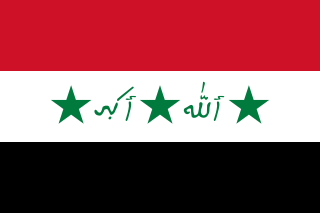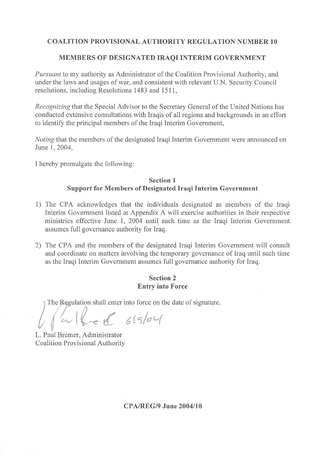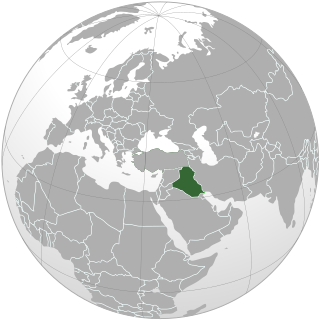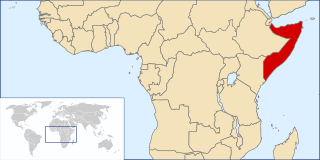
The Coalition Provisional Authority was a transitional government of Iraq established following the invasion of the country on 19 March 2003 by the U.S.-led Multinational Force and the fall of Ba'athist Iraq.
In May 2003, following the invasion of Iraq in March of that year, the Central Bank of Iraq-Development Fund for Iraq (DFI) account was created at the U.S. Federal Reserve Bank of New York at the request of the Coalition Provisional Authority (CPA) Administrator. A part of the fund has been transferred to Baghdad and Iraq, and the DFI-Baghdad account was opened at the Central Bank of Iraq "for cash payment requirements". The fund also eventually received money from seized and "vested" Iraqi bank accounts and funds seized by coalition forces. $650 million of this amount belongs to Uday Saddam Hussein, the older son of the former Iraqi president. The DFI have been disbursed mainly for "the wheat purchase program, the currency exchange program, the electricity and oil infrastructure programs, equipment for Iraqis security forces, and for Iraqi civil service salaries and ministry budget operations".

United Nations Security Council resolution 1483, adopted on 22 May 2003, after recalling all previous resolutions on the situation between Iraq and Kuwait, the Council lifted trade sanctions against Iraq and terminated the Oil-for-Food Programme.

United Nations Security Council resolution 1546, adopted unanimously on 8 June 2004, after reaffirming previous resolutions on Iraq, the Council endorsed the formation of the Iraqi Interim Government, welcomed the end of the occupation and determined the status of the multinational force and its relationship with the Iraqi government.
The ISIL (Da'esh) and Al-Qaida Sanctions Committee is a committee of the United Nations Security Council tasked with implementing international sanctions against the Islamic State and al-Qaeda. It was established as the Al-Qaida and Taliban Sanctions Committee on 15 October 1999, pursuant to Security Council Resolution 1267, which designated al-Qaeda and the Taliban as terrorist organizations. Following the creation of a separate Taliban Sanctions Committee on 17 June 2011, it was renamed the Al-Qaida Sanctions Committee. The scope of the sanctions regime was expanded to include the Islamic State on 17 December 2015 pursuant to Resolution 2253.

United Nations Security Council Resolution 1905, adopted unanimously on December 21, 2009, after noting the letter from Prime Minister of Iraq Nouri al-Maliki, the Council extended until 31 December 2010 the arrangements for depositing proceeds from oil and gas export sales into the Development Fund for Iraq, established under Resolution 1483 (2003).

United Nations Security Council resolution 700, adopted unanimously on 17 June 1991, after recalling resolutions 661 (1991), 665 (1991), 670 (1991) and 687 (1991), and noting the report by the Secretary-General it requested, the council, acting under Chapter VII, the Council approved the full implementation of Resolution 687–the arms embargo against Iraq.

United Nations Security Council Resolution 1916, adopted unanimously on March 19, 2010, after recalling resolutions 733 (1992), 1519 (2003), 1558 (2004), 1587 (2004), 1630 (2005), 1676 (2006), 1724 (2006), 1744 (2007), 1766 (2007), 1772 (2007), 1801 (2008), 1811 (2008), 1844 (2008), 1853 (2008), 1862 (2009), 1894 (2009) and 1907 (2009), the Council extended the term of the Monitoring Group for 12 months and expanded its mandate to include the monitoring of the arms embargo on Eritrea in addition to Somalia.
United Nations Security Council resolution 1519 was adopted unanimously on 16 December 2003. After recalling resolutions on the situation in Somalia, particularly resolutions 733 (1992), 1356 (2001), 1407 (2002), 1425 (2002) and 1474 (2003), the council requested the establishment of a monitoring group to investigate violations of the arms embargo against the country.

United Nations Security Council resolution 1533, adopted unanimously on 12 March 2004, after recalling all previous resolutions on the situation in the Democratic Republic of the Congo, the council established a committee to monitor an arms embargo imposed on all foreign and Congolese forces in the east of the country.

United Nations Security Council resolution 1558, adopted unanimously on 17 August 2004, after recalling previous resolutions on the situation in Somalia, particularly resolutions 733 (1992) and 1519 (2003), the Council re-established a group to monitor the arms embargo against the country for a further six months.

United Nations Security Council resolution 1596, adopted unanimously on 18 April 2005, after recalling all previous resolutions on the situation in the Democratic Republic of the Congo, including resolutions 1493 (2003), 1533 (2004), 1552 (2004), 1565 (2004) and 1592 (2005), the council expanded the arms embargo to include all recipients of weapons in the country, and imposed a travel ban and asset freeze on those violating the embargo.

United Nations Security Council resolution 1630, adopted unanimously on 14 October 2005, after recalling previous resolutions on the situation in Somalia, particularly resolutions 733 (1992), 1519 (2003), 1558 (2004) and 1587 (2005), the council re-established a group to monitor the arms embargo against the country for a further six months and condemned the increase in flow of weapons to the country in violation of the embargo.

United Nations Security Council Resolution 1676, adopted unanimously on May 10, 2006, after recalling previous resolutions on the situation in Somalia, particularly resolutions 733 (1992), 1519 (2003), 1558 (2004), 1587 (2005) and 1630 (2006), the Council re-established a group to monitor the arms embargo against the country for a further six months.

United Nations Security Council Resolution 1724, adopted unanimously on November 29, 2006, after recalling previous resolutions on the situation in Somalia, particularly resolutions 733 (1992), 1519 (2003), 1558 (2004), 1587 (2005), 1630 (2006) and 1676 (2006), the Council re-established a group to monitor the arms embargo against the country for a further six months and condemned an increase in the flow of weapons to the country.
United Nations Security Council Resolution 1766 was unanimously adopted on 23 July 2007.
United Nations Security Council Resolution 1811 was unanimously adopted on 29 April 2008.

United Nations Security Council Resolution 2021 was unanimously adopted on 29 November 2011.

United Nations Security Council Resolution 2025 was unanimously adopted on 14 December 2011.














